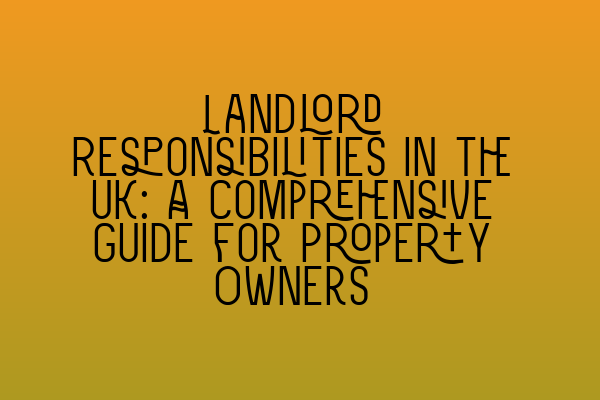Landlord Responsibilities in the UK: A Comprehensive Guide for Property Owners
Being a landlord in the UK comes with a set of legal responsibilities that you must fulfill to ensure the smooth running of your property and the well-being of your tenants. Understanding and abiding by these responsibilities is crucial for maintaining a good landlord-tenant relationship and avoiding any potential legal disputes. In this comprehensive guide, we will walk you through the key responsibilities that every property owner should be aware of.
1. Providing a Safe and Healthy Environment
As a landlord, you have a duty to provide your tenants with a safe and healthy living environment. This includes ensuring that your property meets the necessary safety standards, such as having working smoke alarms and carbon monoxide detectors installed. Regular maintenance checks should be carried out to identify and rectify any hazards that may arise.
2. Repair and Maintenance
It is your responsibility as a landlord to keep your property in a good state of repair and carry out necessary maintenance work. This includes fixing any structural issues, repairing faulty appliances, and addressing any defects that could pose a risk to your tenants’ safety.
To stay on top of maintenance tasks, it is beneficial to establish a regular inspection schedule. These inspections will allow you to identify any potential issues early on and address them promptly. Keeping detailed records of inspections, repairs, and maintenance work carried out is essential for evidential purposes in case of disputes.
3. Gas and Electrical Safety
Gas and electrical safety are crucial aspects of being a responsible landlord. You must ensure that all gas appliances and installations in your property are serviced and inspected by a Gas Safe registered engineer annually. A Gas Safety Certificate should be obtained to confirm that these appliances meet the necessary safety standards.
Additionally, regular electrical inspections must be carried out by a qualified electrician to ensure that the wiring, sockets, and electrical appliances in your property are safe and comply with the relevant regulations. Ensuring that you have an Electrical Installation Condition Report (EICR) is essential to demonstrate compliance with electrical safety standards.
4. Property Insurance
As a landlord, it is highly recommended that you have appropriate property insurance in place to protect your investment. Landlord insurance typically covers risks such as loss of rental income, damage caused by tenants, and certain legal expenses. Having the right insurance coverage provides you with peace of mind and financial protection in the event of unforeseen circumstances or accidents.
5. Tenancy Agreements and Deposits
Creating a well-drafted tenancy agreement is vital for establishing clear expectations and responsibilities between you and your tenants. The agreement should outline essential details such as the duration of the tenancy, rent amount and payment terms, and both parties’ obligations.
Furthermore, when receiving a tenancy deposit, it is essential to protect it in a government-approved tenancy deposit scheme (TDP). This scheme ensures that the deposit is securely held and can be returned to the tenant at the end of the tenancy, minus any reasonable deductions for damages or outstanding rent.
6. Health and Safety at Work
If you employ any staff to carry out maintenance or property management tasks, you must comply with health and safety workplace regulations. This includes providing a safe working environment, conducting risk assessments, and ensuring that any required training is provided.
7. Compliance with Fair Housing Laws
Landlords in the UK must adhere to fair housing laws, which prohibit discrimination on the basis of characteristics such as race, gender, religion, or disability. It is vital to treat all prospective and existing tenants fairly and equally, ensuring that your rental processes and policies do not discriminate against any protected groups.
By understanding and fulfilling these landlord responsibilities, you can ensure a positive and legally compliant renting experience for both you and your tenants. Remember, maintaining open communication and addressing any concerns or issues promptly will contribute to a harmonious landlord-tenant relationship.
For further information on property law and landlord responsibilities, you may find the following articles useful:
– SQE 1 Practice Exam Questions
– SQE 1 Practice Mocks FLK1 FLK2
– SQE 2 Preparation Courses
– SQE 1 Preparation Courses
– SRA SQE Exam Dates
Remember, being a responsible landlord not only ensures legal compliance but also contributes to a positive rental experience for both you and your tenants.
